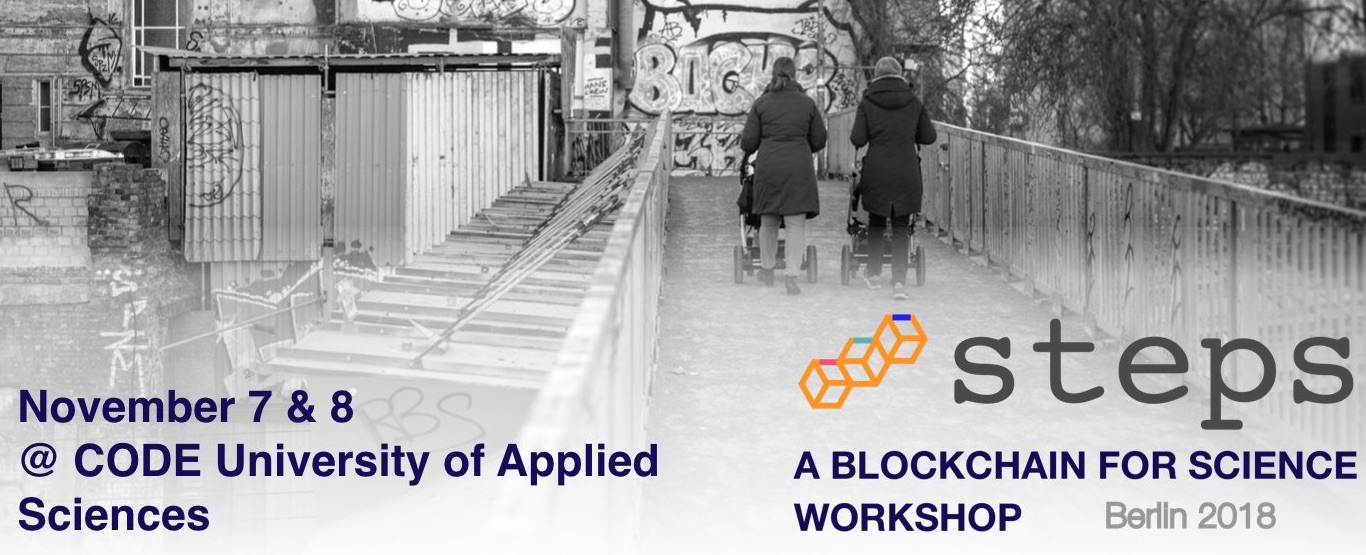Blockchain backed applications for science, technology, education, publishing and society.
Date:
November 7th & 8th, 2018
Location:
CODE University of Applied Sciences
Lohmühlenstraße 65
Berlin
Organisation:
Dr. Martin Etzrodt, PD Dr. Sönke Bartling
Why Blockchain for Science?
Academia at present relies on hierarchical, closed infrastructures for the governance and dissemination of knowledge. Scientist are strongly dependent on scientific publishing companies as the trusted third party for attribution of scientific work and reputation building. In return, publishers monopolise on the dissemination of scientific findings creating unnecessary friction and block free and public access to knowledge.
The decentralised web (web 3.0) offers new opportunities to revisit scientific claim attribution and the infrastructure for knowledge creation and dissemination. Web3.0 may finally create the foundation for new, open and collaborative scientific institutions, revolutionise scientific communication, education and ultimately society at large. It is really building the new Open Science Ecosystem.
What is STEPS?
This workshop specifically aimed at students and professionals from academia but also researchers from industry of all traits that are interested to gain hands on experience in the currently emerging field of trusted, decentralised web technologies for science and knowledge creation.
The workshop will provide relevant background and hands on skills. Specifically we will focus on the following questions:
- What is blockchain technology?
- How can we interact with and create on the decentralised web?
- How can the technology be applied to disseminate knowledge in an faster, easier and open way?
- Which mechanisms may be utilised to ensuring scientific rigour and quality while ensuring fair attribution for the creators?
- How can new value flows be created to incentivise, finance and assure quality control?
The first part of this hands-on workshop will be offered by our blockchain education partner Validity Labs. Furthermore you will have the chance to interact with leading developers of current projects of the new Open Science Ecosystem and get a first hand insight into the tools they are currently building.
We welcome scientist of all career stages and backgrounds. Some basic idea of coding and very basic tool usage such as text editors is an advantage.
Please note the following requirements to get the most out of your participation:
Program Day 1
Morning session
Dr. Martin Etzrodt, Researcher at Akasha Foundation Zug, Gotthold Fläschner, ETH Zurich & Qianchen Yu dApp Developer @ Validity Labs Zug, Switzerland.
| Time | Contents | What to expect |
| 09:00-9:15 | Introductory remarks | |
| 09:15-10:00 | Blockchain Basics | The mathematical & cryptographic background behind blockchain |
| 10:00-10:25 | Introduction to Ethereum & smart contracts | First impression of how human-blockchain interacts. |
| 10:25-10:35 | Coffee Break | |
| 10:35-11:05 | Where is my Swiss Army knife: intro to Dev tools | Overall understanding of the dApp develop tools, steps, docs.
Make sure all tools are correctly setup |
| 11:05-11:35 | Get to know your Swiss Army knife: Dev tools 102 | Familiar with the dev ecosystem – how to compile, input, trace transactions (etherscan), faucet.
Understand functions, public, basic parameter types. |
| 11:35-12:30 | Lunch break | |
| 12:30-13:45 | Make something big: create your own DAO | Familiar with bool, address, mapping, logs, modifier, struct, require, msg.sender |
| 13:45-14:00 | Smart contracts in action | Open discussion and wrap up |
Take Aways
- Learning the fundamentals of blockchain with a deep dive into the world of smart-contracts.
- Build a small DAO together with Solidity
Training documentation will be provided during the workshop as pdf/ web resource.
Afternoon session
| Time | Contents | Link |
| 15:00-15:45 | ScienceMatters & the Eureka platform (Lawrence Rajendran) | eurekatoken.io |
| 15:45-16:30 | Frankl – Open Science on the blockchain (Jon Brock) | frankl.io |
| 16:30-17:00 | Break | |
| 17:00-17:45 | DEIP Decentralised research platform (Alex Shkor) | deip.world |
| 17:45-18:30 | Pluto Network Decentralised scholarly communication (Sanghyun Baek) | pluto.network |
| 18:30-18:45 | Break | |
| 18:45-19:30 | Fractal flows (Imad Abdhalla) | fractalflows.com |
| 19:30 – 20.15 | artifacts.ai (Kevin McCurry) | artifacts.ai |
| 20:15 | Dinner & Bar | location TBA |
Take Aways
- Presentations and tinkering with software tools provided by leading Blockchain For Science projects.
Program Day 2
Morning session 1 – hot topics in the Blockchain for Science field
9.00- 10.30 Keynotes on token design, curation markets & non-fungible tokens (Alex Shkor, DEIP.world & Paul Kohlhaas molecule.to (inquired, TBD))
10:30-11.00 break
Morning session 2 – Idea conference on decentralising science
| Time | Contents | Link |
| 9:30-10.30 | Cryptoeconomics for Science (Alex Shkor) | deip.world |
| 10:30-10:45 | Break | |
| 10:45-11:45 | Curation markets for decentralised research and development (Paul Kohlhaas) | linumlabs.com & molecule.to |
| 11:45-12:00 | Defining working groups for afternoon | Flaeschner, Abdhalla, Bartling, Kohlhaas, Etzrodt |
| 12:00-13:00 | Lunchbreak | |
| 13:00-16.00 | Working groups | |
Afternoon session
Decentralising Science – idea conference
Inspired by the interactive presentations during the morning session working groups will be defined and attendees will collaborate in small groups in a World café style.
Working groups:
-
-
- The fractal nature of discovery (Flaeschner, Abdhalla)
- Identity, rewards & reputation (Etzrodt, Bartling)
- Curation markets, non-fungible tokens and marketplaces for science (Kohlhaas)
- other topic
-
The workshop proceedings co-authored by the participants of the idea conference participants will be published in an open document.
Registration assured until 2nd of November, after that we might sell out.



